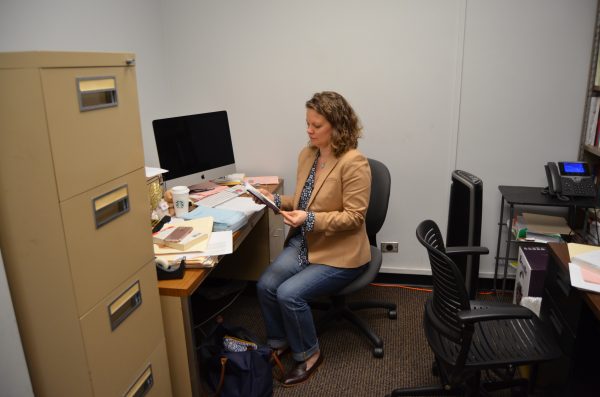L’importance d’apprendre une langue
Kari Evanson, French professor and French Language Coordinator at Fordham. (LOÏC KHODARKOVSKY/THE OBSERVER)
March 14, 2018
Students might think that Fordham University’s foreign language requirement seems like a waste of time or money, but there is more to it than simply learning a new language. It is about discovering a new culture—a new way of thinking. Fordham sees the immense value of learning a new language, even if students initially may not. Whether you are already skilled in multiple languages or are just starting to learn a new one, the benefits are greater than just being able to say a new phrase or conjugate a verb.
Sitting down with Kari Evanson, a French professor and Fordham’s French Language Coordinator, she makes it clear that learning a language is about more than just memorizing grammar rules, it’s about discovering a new culture. As someone who started learning French in high school and continued her studies throughout college, Evanson’s appreciation for the French language and Francophone cultures is something that she wants to pass on to her students.
For Evanson, “it’s important, especially for American students, to learn about other cultures [and] to see how other people live, to see how other people view their world.” To learn another language is to see through another’s eyes, and Evanson believes that learning a new language gives both a “greater understanding” of other people and “a better understanding of who you are.”
One of Evanson’s favorite parts about learning a new language is when she comes across a word or a phrase that is “untranslatable.” These words and phrases generally relate to an emotion that reflects the values and morals of the culture, which Evanson finds fascinating. An example of this is the phrase “coup de foudre,” which means “to fall in love” or “to experience love at first sight.” The direct translation equates to being unexpectedly struck or blown by lightning, but the French connect it to the feeling of love.
In addition to the new understanding of a culture, there are a great deal of mental benefits to learning a foreign language that can last a lifetime. As humans age, learning more than one language can actually help them prevent cognitive diseases like Alzheimer’s and dementia. Even at a young age, learning a new language can improve test scores, improve information processing and help with creative thinking.
Having to juggle two or more languages requires the memorization of verbs and grammar rules, which can enhance multitasking skills. It can also help improve memory, as learning new languages helps strengthen the parts of the brain associated with memorization.
Studies from the American Council of Teaching Foreign Languages show that the younger one learns a foreign language, the better one tends to comprehend and retain that language. Until someone is eight years old, “the way the brain processes a foreign language is the same way the brain processes a mother tongue,” Evanson said. This can give students the tools to use a language to study the history of other cultures and even learn math or science in another language.
While it may feel like a pain to have to take up to four classes in a language, and there may be moments of frustration and annoyance as you struggle to understand a new verb tense or a new sentence structure, the benefits greatly outweigh the aggravation. To learn a new language is to understand a new culture and better understand yourself. This knowledge gives you the tools to approach your studies in a new light, which are skills and attributes that last far beyond four classes.












